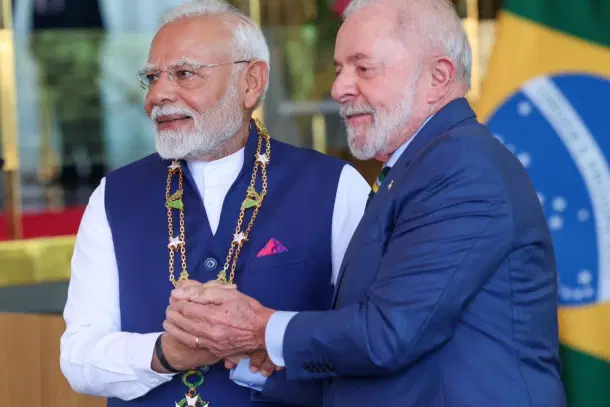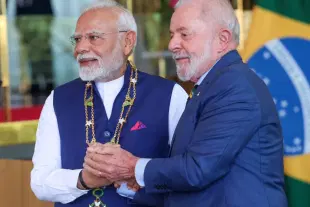News Brief
Defence, Food Security, Climate, Emerging Tech And Industry: Five Key Highlights From India-Brazil Joint Statement
Kuldeep Negi
Jul 09, 2025, 06:11 PM | Updated 06:11 PM IST
Save & read from anywhere!
Bookmark stories for easy access on any device or the Swarajya app.


Prime Minister Narendra Modi and Brazilian President Luiz Inácio Lula da Silva on Wednesday (9 July) unveiled a strategic roadmap to elevate bilateral ties between their countries.
In a joint statement during PM Modi's state visit to Brazil, both leaders highlighted five priority areas: defense and security, food and nutritional security, energy transition and climate change, digital transformation and emerging technologies, and industrial partnerships in strategic areas to further strengthen bilateral ties over the next decade.
1. Defense and Security
Recognizing the convergent views and strategic complementarities in defense and security matters between Brazil and India, the leaders welcomed the growing defense cooperation, including participation in joint military exercises and the exchange of high-level defense delegations.
They expressed satisfaction with the signing of the Agreement on the Exchange and Mutual Protection of Classified Information, which will enable deeper cooperation in various strategic areas.
The two leaders also welcomed the establishment of a Bilateral Cybersecurity Dialogue as a platform to deepen cooperation through the exchange of information, experiences, and national perspectives on cybersecurity issues.
PM Modi also expressed his deep appreciation to Brazil for its strong condemnation of the 22 April terrorist attack in Pahalgam in Jammu and Kashmir.
Both leaders unequivocally condemned terrorism, including cross-border terrorism and violent extremism in all its forms and manifestations.
They stressed the urgent need for a united international response to terrorism and stressed that such heinous acts have no justification.
The leaders reaffirmed their commitment to cooperate in preventing and combating transnational organized crime and terrorism.
In this context, they welcome the signing of the Brazil-India Agreement on Cooperation in Combating International Terrorism and Transnational Organized Crime.
The leaders called for concerted actions against all UN designated terrorists and terrorist entities, including those designated by the 1267 UNSC Sanctions Committee like Lashkar-e-Tayyiba (LeT) and Jaish-e-Mohammad (JeM), both Pakistan-based terror outfits.
The leaders reaffirmed strong commitment to continue taking active measures to disrupt the terror financing channels including at the UN and FATF.
On space cooperation, the leaders agreed to explore joint efforts in satellite design, development, launch vehicles, and commercial launches.
They also stressed the need for multilateralism to address global security concerns, advocating for stronger diplomatic mechanisms and peacebuilding initiatives.
India and Brazil committed to reforming the United Nations Security Council for better representation of developing countries and expressed mutual support for each other’s candidatures.
The leaders also expressed concern about the Middle East security situation, reiterating their support for a two-state solution for Palestine and Israel.
They emphasised continued dialogue to resolve conflicts and called for sustained peace efforts, humanitarian access to Gaza, and the release of hostages. Both leaders also reaffirmed their support for UNRWA’s mandate for Palestine refugees.
Regarding Ukraine, the leaders regretted the human and material losses and called for diplomatic efforts towards a peaceful resolution, highlighting the broader impact on the Global South.
2. Food and Nutritional Security
The two leaders agreed to prioritise food and nutritional security by supporting sustainable agricultural practices and improving productivity.
They expressed a shared goal to eradicate hunger by 2030 and committed to the Global Alliance Against Hunger and Poverty.
Both nations highlighted the importance of open, fair agricultural trade to support resilient food systems, ensuring fair access to resources for all.
Joint research initiatives on agricultural productivity and sustainable practices were emphasised, alongside addressing challenges like malnutrition through inclusive social policies.
They called on the international community to ensure that agricultural trade is not undermined by unilateral restrictions or protectionist measures introduced under the pretext of environmental, security or climate concerns while respecting open, fair, transparent, inclusive, equitable, non-discriminatory and rules-based multilateral trading system, with WTO at its core.
3. Energy Transition and Climate Change
India and Brazil committed to deepening cooperation in energy transition and climate change mitigation.
They agreed to advance biofuel technologies and flex-fuel vehicles through the Global Biofuels Alliance.
Both countries underscored the importance of Sustainable Aviation Fuel (SAF) to reduce emissions in aviation.
The leaders expressed support for Brazil’s Tropical Forests Forever Fund (TFFF), focusing on tropical forest conservation ahead of COP30.
Both countries reaffirmed their dedication to climate action through the Paris Agreement and pledged to expand efforts on renewable energy and climate finance, particularly through collaborations in solar energy and disaster-resilient infrastructure.
4. Digital Transformation and Emerging Technologies
The leaders agreed to enhance digital transformation by fostering cooperation in Digital Public Infrastructure, artificial intelligence (AI), and quantum technologies.
They welcomed the signing of a Memorandum of Understanding (MoU) to share best practices, foster innovation, and work on capacity-building initiatives.
India and Brazil committed to addressing the ethical challenges posed by AI, ensuring technology governance frameworks are in place.
The countries also pledged to collaborate on digital governance in multilateral forums and to explore further joint projects that promote digital inclusion and innovation for their citizens.
The leaders reaffirmed their view on the potential for increasing bilateral cooperation in Science, Technology, and Innovation (STI), based on shared values and complementary strengths of both countries.
They agreed on the need to convene the Joint Commission on Scientific and Technological Cooperation, to foster collaboration in priority areas for both countries, such as digital public infrastructure, artificial intelligence, quantum technologies, renewable energy, and outer space.
5. Industrial Partnerships in Strategic Areas
Both leaders reaffirmed their willingness to deepening bilateral economic and trade relations.
Recognising the huge potential for growth in trade flows between their countries, they agreed to explore commercial and technological complementarities between both countries and to further collaborate, including through bilateral partnerships, in the following key industrial sectors: (i) pharmaceutical industry; (ii) defence equipment; (iii) mining & minerals; and (iv) oil & gas sector, including research, exploration, extraction, refining, and distribution.
Both countries recognized the potential for cooperation in pharmaceuticals, especially in the joint research and development of essential medicines.
In defence, they committed to exploring collaboration in land systems, maritime assets, and aerial capabilities.
Leaders also emphasized the role of critical minerals in clean energy technology and agreed to collaborate on mineral exploration and processing.
In the oil and gas sector, the two nations pledged to explore joint ventures, including offshore oil fields and carbon capture technologies.
They also agreed to address non-tariff barriers to enhance bilateral trade.
Kuldeep is Senior Editor (Newsroom) at Swarajya. He tweets at @kaydnegi.





